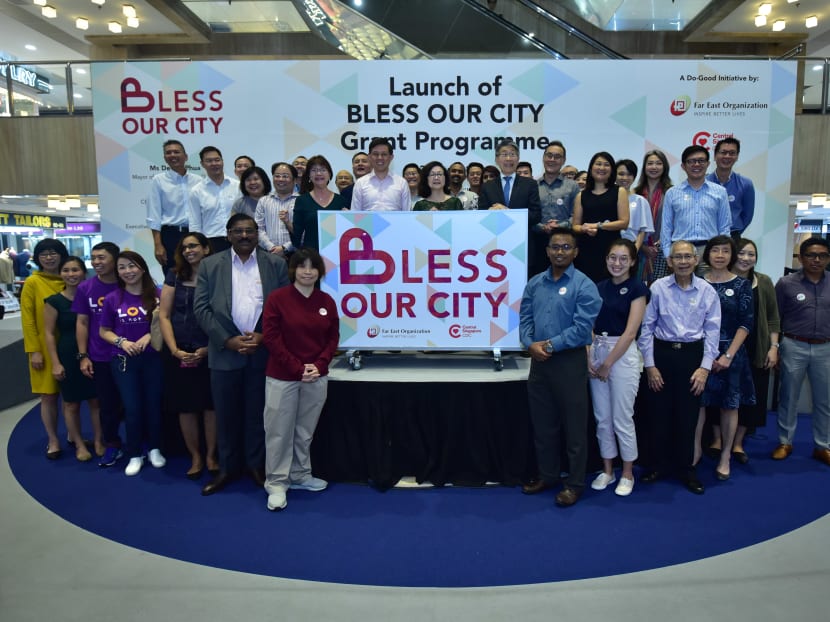S$1 million grant to boost support for people with special needs, ex-offenders, transient workers
SINGAPORE — Organisations across Singapore that help people in need such as ex-offenders, those suffering mental health problems, and transient workers, stand to benefit from a new S$1 million grant programme.

At least 50 social service and community organisations will each receive up to S$20,000 under a programme called “Bless Our City”.
SINGAPORE — Organisations across Singapore that help people in need such as ex-offenders, those suffering mental health problems, and transient workers, stand to benefit from a new S$1 million grant programme.
At least 50 social service and community organisations will each receive up to S$20,000 under the programme, called “Bless Our City”, unveiled on Monday (May 13). So far, 40 organisations have been invited to take part.
The programme is a joint effort between real estate developer Far East Organisation and the Central Singapore Community Development Council (CDC).
The two-year initiative “commemorates the spirit of care and contribution by our forefathers this Singapore bicentennial”, the two organisations said in a media release on Monday.
The grants made in “Bless Our City” will, for example, help feed more injured migrant workers, extend help to people with dementia outside of nursing homes, and enhance learning courses for ex-offenders, among other causes.
The grants will support social services and organisations that serve five communities:
-
Ex-offenders
-
Persons with mental health issues
-
Persons with special needs
-
Transient workers
-
Vulnerable families and individuals.
Mayor Denise Phua of the Central Singapore District said at the programme’s launch on Monday that these five communities were chosen due to “existing and emerging social needs”.
“These are needs that we’ve identified from our touch with the ground, based on requests and appeals that have come in, and also from what we see in public statements,” she said.
For example, as the Singapore population ages, many elderly people are being afflicted with dementia. Also, migrant workers are common here.
“And for ex-offenders, it’s not just a one-time (matter), it’s a continuous effort. If we support them well, they get a second or third chance,” said Ms Phua.
The Central Singapore CDC has invited 40 organisations to receive the grant and will continue to reach out to more beneficiaries.
EXTENDED CARE FOR PERSONS WITH DEMENTIA
One of the potential beneficiaries is Apex Harmony Lodge, which operates a purpose-built lodge for people with dementia, housing about 210 residents, with another 25 people in its day-care services.
The grant will go to expanding programmes outside of the centre, to include persons with dementia still living in their own homes, Apex said.
Ms Tay Su Yin, 31, assistant manager for Apex’s corporate development and community engagement said that the lodge aims to reach out to 100 of these dementia patients over the next three years.
“So for these people, they can also come in to enjoy dementia-appropriate types of activities.”
The grant will also help in offering more arts- and music-related programmes for Apex’s residents, she added.
SUPPORTING EX-OFFENDERS
Another beneficiary is non-profit organisation The New Charis Mission, which said that it will use the grant to enhance its existing residential rehabilitation programme for ex-offenders.
In the programme, ex-offenders undergo training to become mentors for at-risk students in schools, counsellors to prison inmates, or befrienders of elderly residents.
Mr Dennis Goh, a full-time staff member at the centre, said: “With this grant, it will really open up many doors for us to be further equipped, trained, and to be able to perform the tasks for individual work.”
An ex-offender himself, Mr Goh, 43, went through the programme five years ago and is now taking a theological course supported by the centre.
“For these ex-offenders and ex-drug addicts, it’s not just for them to quit drugs (or quit their crimes), but rather, we also want them to be contributors to society,” said Mr Goh.
HELPING TRANSIENT WORKERS
Migrant workers who suffer injuries are not allowed to work and have no source of income as they wait for work injury compensation and for any disputes to be resolved.
With many unable to afford even daily necessities, another beneficiary, Health Serve, provides a lunch service to support these workers, for South Asian and Chinese nationals.
For South Asian workers, the food project runs three days a week, seeing about 100 workers a day.
With the grant, the organisation is hoping to expand it to a five-day programme, said Health Serve’s executive director Michael Cheah, 43.
Mr Cheah said: “It’s something we’ve seen to be a growing need, and when it comes to food, it’s the simplest thing we can provide for these workers.”






